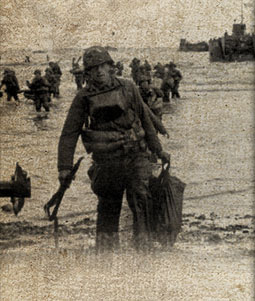
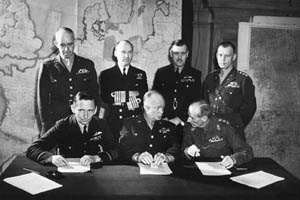 Only a few days in each month were suitable for launching the operation: a day near the full moon was needed both for illumination during the hours of darkness and for the spring tide, the former to illuminate navigational landmarks for the crews of aircraft, gliders and landing craft, and the latter to provide the deepest possible water to help safe navigation over defensive obstacles placed by the Germans in the surf on the seaward approaches to the beaches. A full moon occurred on June 6. Allied Expeditionary Force Supreme Commander Dwight D. Eisenhower had tentatively selected 5 June as the date for the assault. The weather was fine during most of May, but this deteriorated in early June. On 4 June, conditions were clearly unsuitable for a landing; wind and high seas would make it impossible to launch landing craft from larger ships at sea, and low clouds would prevent aircraft finding their targets. The Allied troop convoys already at sea were forced to take shelter in bays and inlets on the south coast of Britain for the night.
Only a few days in each month were suitable for launching the operation: a day near the full moon was needed both for illumination during the hours of darkness and for the spring tide, the former to illuminate navigational landmarks for the crews of aircraft, gliders and landing craft, and the latter to provide the deepest possible water to help safe navigation over defensive obstacles placed by the Germans in the surf on the seaward approaches to the beaches. A full moon occurred on June 6. Allied Expeditionary Force Supreme Commander Dwight D. Eisenhower had tentatively selected 5 June as the date for the assault. The weather was fine during most of May, but this deteriorated in early June. On 4 June, conditions were clearly unsuitable for a landing; wind and high seas would make it impossible to launch landing craft from larger ships at sea, and low clouds would prevent aircraft finding their targets. The Allied troop convoys already at sea were forced to take shelter in bays and inlets on the south coast of Britain for the night.
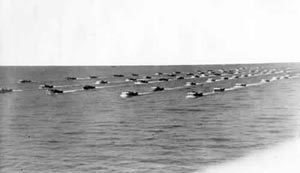 It seemed possible that everything would have to be cancelled and the troops returned to their embarkation camps (which would be almost impossible, as the enormous movement of follow-up formations into them was already proceeding). The next full moon period would be nearly a month away. At a vital meeting on 5 June, Eisenhower's chief meteorologist (Group Captain J.M. Stagg) forecast a brief improvement for 6 June. General Bernard Montgomery and Eisenhower's Chief of Staff General Walter Bedell Smith wished to proceed with the invasion. Air Chief Marshal Leigh Mallory was doubtful, but Admiral Bertram Ramsay believed that conditions would be marginally favourable. On the strength of Stagg's forecast, Eisenhower ordered the invasion to proceed. In the event, prevailing overcast skies limited Allied air support, and no serious damage was done to the beach defences on Omaha and Juno.
It seemed possible that everything would have to be cancelled and the troops returned to their embarkation camps (which would be almost impossible, as the enormous movement of follow-up formations into them was already proceeding). The next full moon period would be nearly a month away. At a vital meeting on 5 June, Eisenhower's chief meteorologist (Group Captain J.M. Stagg) forecast a brief improvement for 6 June. General Bernard Montgomery and Eisenhower's Chief of Staff General Walter Bedell Smith wished to proceed with the invasion. Air Chief Marshal Leigh Mallory was doubtful, but Admiral Bertram Ramsay believed that conditions would be marginally favourable. On the strength of Stagg's forecast, Eisenhower ordered the invasion to proceed. In the event, prevailing overcast skies limited Allied air support, and no serious damage was done to the beach defences on Omaha and Juno.
The Germans meanwhile took comfort from the existing poor conditions, which were worse over Northern France than over the Channel itself, and believed no invasion would be possible for several days. Some troops stood down, and many senior officers were away for the weekend. Field Marshal Erwin Rommel, for example, took a few days' leave to celebrate his wife's birthday. While dozens of division, regimental, and battalion commanders were away from their posts at war games, the Allied forces were attacking.
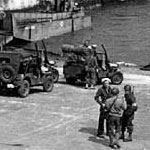 |
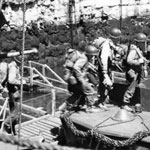 |
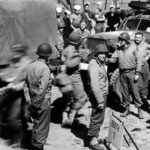 |
|---|
